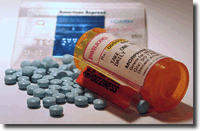About Drug Addiction
- Teen Drug Addiction
- Understanding Drug Addiction
- Effects of Drug Addiction
- Dangers of Drug Addiction
- Stages of Drug Addiction
- Signs of Drug Addiction
- Drug Addiction Withdrawal
- Drug Addiction Relapse
- Drug Addiction Facts
- Drug Addiction Overdose
- Drug Addiction Help
- Drug Addiction Intervention
- Drug Addiction Detox
- Drug Addiction Treatment
- Drug Addiction Rehab
- Drug Addiction Counseling
- What is a Drug Addict
- Drug Addiction Information
- Drug Addiction Statistics
- Drug Addiction Testing

Morphine Addiction
 New clues emerge for understanding Morphine addiction. Scientists are adding additional brush strokes to the revolutionary new image now emerging for star-shaped cells called astrocytes in the brain and spinal cord. Their report, which suggests a key role for astrocytes in Morphine's ability to relieve pain and cause addiction, appears online in ACS' Journal of Proteome Research, a monthly publication.
New clues emerge for understanding Morphine addiction. Scientists are adding additional brush strokes to the revolutionary new image now emerging for star-shaped cells called astrocytes in the brain and spinal cord. Their report, which suggests a key role for astrocytes in Morphine's ability to relieve pain and cause addiction, appears online in ACS' Journal of Proteome Research, a monthly publication.
In the study, Piotr Suder and colleagues point out that nearly everyone viewed astrocytes -- the most abundant cells in the brain -- as supporting actors in the drama of brain activity. Scientists thought astrocytes simply propped up neurons, nerve cells that transmit signals, and kept them in proper position. Studies during the last several years, however, suggest that these cells are just as their Greek name suggests -- stars.
The scientists added Morphine to a group of astrocytes in cell culture for several days. They found that the Morphine-exposed cells showed increased levels of nine proteins that appear to play a role in maintaining the normal function of nerve cells. "These proteins, after additional detailed study of their function, may serve as a potential marker of drug addiction, or may be the targets for potential therapy," the article notes.
What is Morphine? Generically known only as ‘morphine,’ the drug is sold under a number of brand names including Avinza, Kadian, MS Contain, MSIR, Oramorph SR, and Roxanol. Street names for Morphine, according to the National Institute on Drug Abuse, include Duramorph, M, Miss Emma, Monkey, Roxanol, and White Stuff. It is classified as a narcotic pain reliever, which means that it works by hampering the way your brain perceives pain. Both short-acting and extended release versions of Morphine are available.
For moderate pain, the short-acting version is usually prescribed; the extended release version is usually reserved for those who have chronic or severe pain. Morphine is commonly available in the form of a tablet, syrup, injection, or as a suppository. Depending on its form, Morphine may be injected, swallowed, or even smoked. Because of its high potency, Morphine is sometimes abused by heroin addicts when they are unable to obtain heroin (both drugs are in the same opiate family of drugs).
The biggest issue with continued Morphine use is the development of Morphine addiction. Morphine is one of the most powerful opiates on the market today, a drug commonly prescribed for moderate to severe pain in hospitals. Rarely prescribed for take-home use, Morphine is highly addictive. After only a short time of regular use, Morphine use quickly turns into Morphine abuse and then Morphine addiction.
Everyone who takes Morphine for an extended period of time on a regular basis will develop a physical dependence upon the drug. This means that more and more of the drug will be needed to in order to maintain the same level of pain management as originally experienced. When this happens, it is described as developing a Morphine tolerance and this is a hallmark of Morphine addiction.
When you start to crave Morphine, wanting more before your scheduled dose time or wanting more than the amount prescribed, are additional hallmarks of Morphine addiction. Psychological cravings and the desire to augment the prescription with more Morphine, other opiate painkillers or other drugs including alcohol is a sure sign that Morphine addiction is in effect and Morphine rehab is necessary.
It is possible to develop only a physical addiction to Morphine, but it is not common. Should this happen, you will still require Morphine addiction treatment and rehab in the form of Morphine detox. Here, your focus will be on the physical effects of Morphine addiction, which means medical treatment that assists you in breaking your physical dependence. If psychological dependence is not present, then your treatment will be complete when you stabilize after your Morphine detox.
Ending a Morphine addiction isn't easy - there are numerous, difficult withdrawal symptoms that frequent users experience when trying to stop. Those withdrawal symptoms include:
- Abdominal cramps
- Diarrhea
- Nausea
- Vomiting
- Chills
- Increased blood pressure, heart rate, respiratory rate, or body temperature
If you or someone you love is struggling with Morphine addiction, do not stop taking the drug “cold turkey” and do not wait to get help. A comprehensive drug rehab center that includes both a Morphine detox and psychological Morphine addiction treatment are essential for your recovery.
Drug Addiction
- Alcohol Addiction
- Adderall Addiction
- Ativan Addiction
- Cocaine Addiction
- Crack Addiction
- Ecstasy Addiction
- Heroin Addiction
- Lortab Addiction
- Marijuana Addiction
- Meth Addiction
- Methadone Addiction
- Morphine Addiction
- OxyContin Addiction
- Percocet Addiction
- Ritalin Addiction
- Vicodin Addiction
- Xanax Addiction
